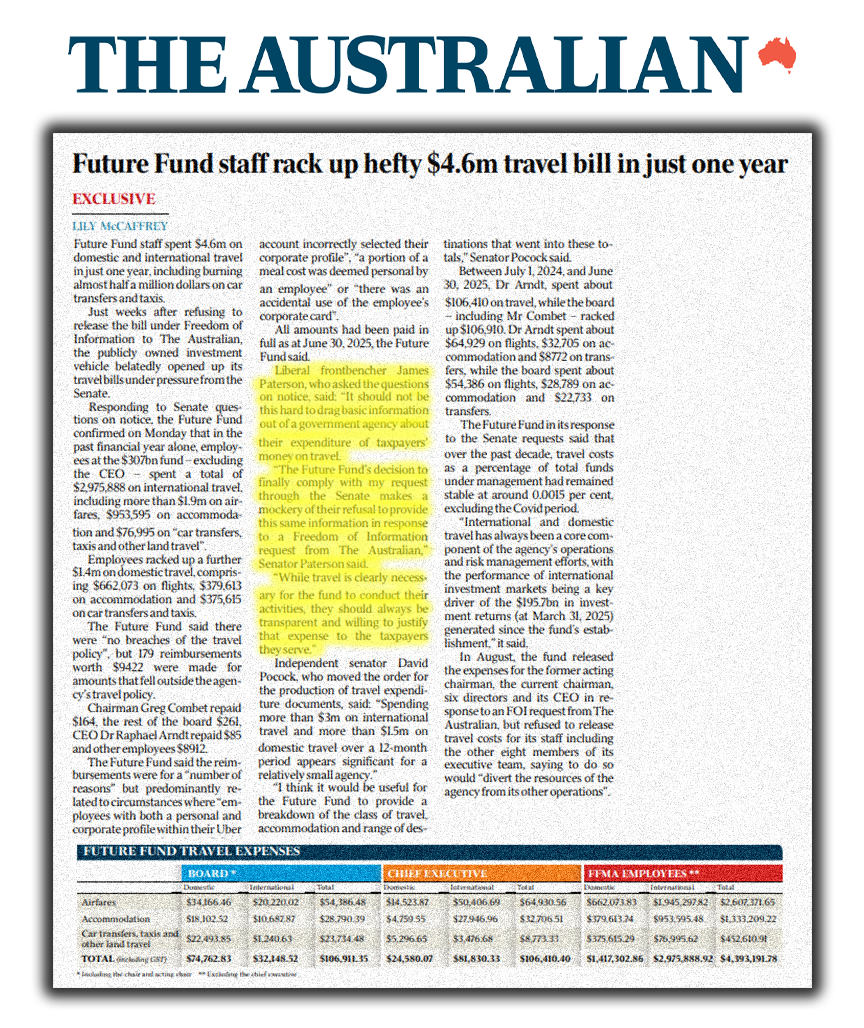Media
|
News
September 2, 2025

Future Fund staff spent $4.6m on domestic and international travel in just one year, including burning almost half a million dollars on car transfers and taxis.
Just weeks after refusing to release the bill under Freedom of Information to The Australian, the publicly owned investment vehicle belatedly opened up its travel bills under pressure from the Senate.
Responding to Senate questions on notice, the Future Fund confirmed on Monday that in the past financial year alone, employees at the $307bn fund excluding the CEO spent a total of $2,975,888 on international travel, including more than $1.9m on airfares, $953,595 on accommodation and $76,995 on "car transfers, taxis and other land travel".
Employees racked up a further $1.4m on domestic travel, comprising $662,073 on flights, $379,613 on accommodation and $375,615 on car transfers and taxis.
The Future Fund said there were "no breaches of the travel policy", but 179 reimbursements worth $9422 were made for amounts that fell outside the agency's travel policy.
Chairman Greg Combet repaid $164, the rest of the board $261, CEO Dr Raphael Arndt repaid $85 and other employees $8912.
The Future Fund said the reimbursements were for a "number of reasons" but predominantly related to circumstances where "employees with both a personal and corporate profile within their Uber account incorrectly selected their corporate profile", "a portion of a meal cost was deemed personal by an employee" or "there was an accidental use of the employee's corporate card".
All amounts had been paid in full as at June 30, 2025, the Future Fund said.
Liberal frontbencher James Paterson, who asked the questions on notice, said: "It should not be this hard to drag basic information out of a government agency about their expenditure of taxpayers' money on travel.
"The Future Fund's decision to finally comply with my request through the Senate makes a mockery of their refusal to provide this same information in response to a Freedom of Information request from The Australian," Senator Paterson said.
"While travel is clearly necessary for the fund to conduct their activities, they should always be transparent and willing to justify that expense to the taxpayers they serve."
Independent senator David Pocock, who moved the order for the production of travel expenditure documents, said: "Spending more than $3m on international travel and more than $1.5m on domestic travel over a 12-month period appears significant for a relatively small agency."
"I think it would be useful for the Future Fund to provide a breakdown of the class of travel, accommodation and range of destinations that went into these totals," Senator Pocock said.
Between July 1, 2024, and June 30, 2025, Dr Arndt, spent about $106,410 on travel, while the board including Mr Combet racked up $106,910. Dr Arndt spent about $64,929 on flights, $32,705 on accommodation and $8772 on transfers, while the board spent about $54,386 on flights, $28,789 on accommodation and $22,733 on transfers.
The Future Fund in its response to the Senate requests said that over the past decade, travel costs as a percentage of total funds under management had remained stable at around 0.0015 per cent, excluding the Covid period.
"International and domestic travel has always been a core component of the agency's operations and risk management efforts, with the performance of international investment markets being a key driver of the $195.7bn in investment returns (at March 31, 2025) generated since the fund's establishment," it said.
In August, the fund released the expenses for the former acting chairman, the current chairman, six directors and its CEO in response to an FOI request from The Australian, but refused to release travel costs for its staff including the other eight members of its executive team, saying to do so would "divert the resources of the agency from its other operations".